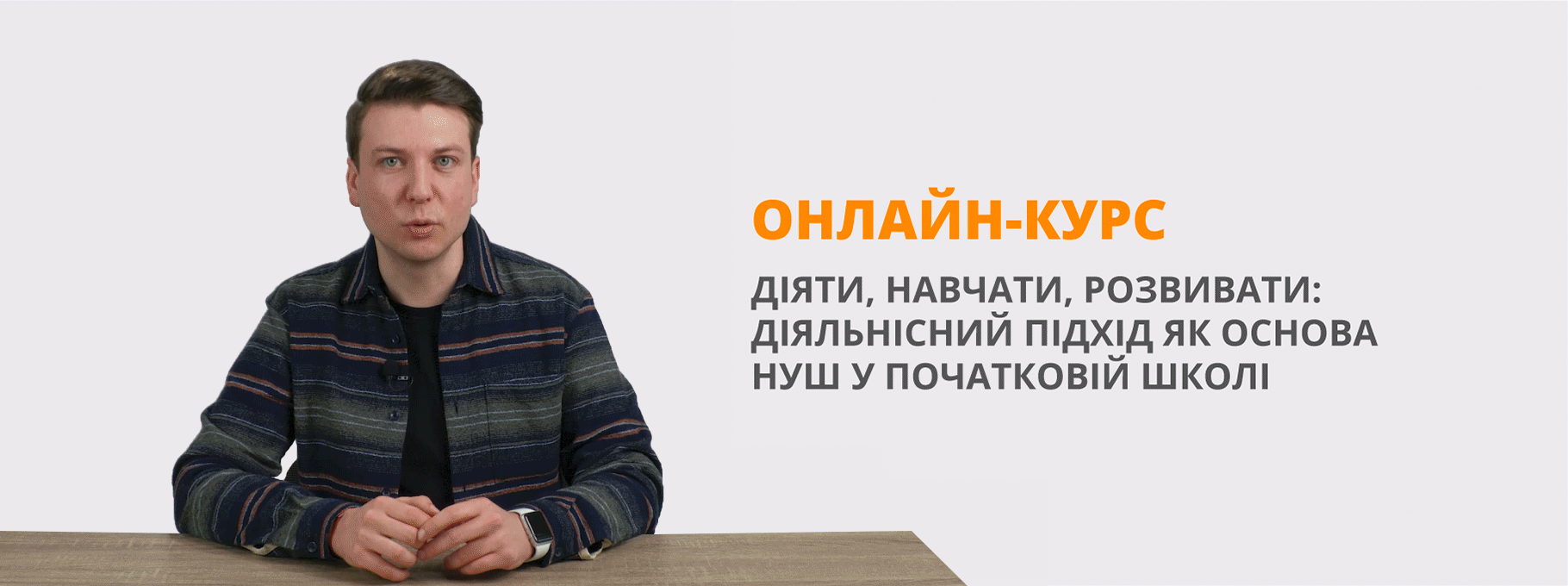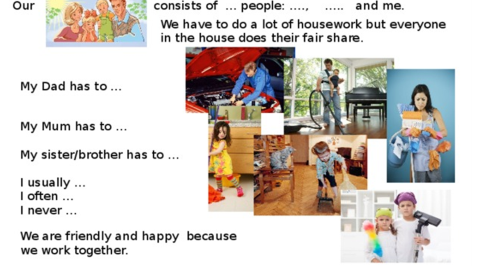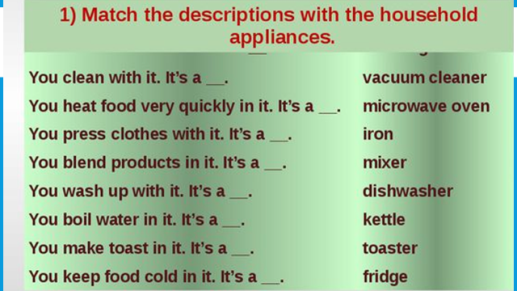Конспект уроку англійської мови
Урок з англійської мови
Тема: Житло. Домашні обов'язки.
Дата проведення: 25.10.2018 7-А клас
Мета: ознайомити з новими ЛО, активізувати вживання лексичних одиниць теми в усному мовленні семикласників, практикувати учнів у зв'язних монологічних та діалогічних висловлюваннях, навчати дітей працювати в парах та групах;
формувати навички аудіювання та читання, вміння вживати ЛО теми в граматичних структурах різночасових форм дієслова, розвивати пам'ять та логічне мислення, навички аналізу та синтезу;
виховувати пізнавальний інтерес, здатність виконувати хатні обов'язки.
Тип уроку: комбінований
Обладнання: прислів'я, вірш для фонетичної зарядки, комп'ютерна презентація «Домашні обов'язки», роздатковий матеріал (картки з граматичним завданням, діалог для читання, музичний супровід, комп'ютер, мультимедійний проектор
Урок
з англійської мови
Тема: Житло. Домашні обов’язки. Дата проведення: 25.10.2018 7-А клас вчитель: Кулікова Л. О.
Тема: Житло. Домашні обов’язки.
Мета: ознайомити з новими ЛО, активізувати вживання лексичних одиниць теми в усному мовленні семикласників, практикувати учнів у зв’язних монологічних та діалогічних висловлюваннях, навчати дітей працювати в парах та групах;
формувати навички аудіювання та читання, вміння вживати ЛО теми в граматичних структурах різночасових форм дієслова, розвивати пам’ять та логічне мислення, навички аналізу та синтезу;
виховувати пізнавальний інтерес, здатність виконувати хатні обов’язки.
Тип уроку: комбінований
Обладнання: прислів’я, вірш для фонетичної зарядки, комп’ютерна презентація «Домашні обов’язки», роздатковий матеріал (картки з граматичним завданням, діалог для читання, музичний супровід, комп’ютер, мультимедійний проектор.
Хід уроку:
І. Організаційний момент
І.1 Greeting
- Good morning, children. How are you? I’m glad to see you. Sit down, please.
Let’s start our work.
I.2 Warm-up Pronunciation drill
|
|
Read the poem When you have a job that’s not much fun, And you wonder when you’ll get it done, Don’t wait till later – time may not allow! Don’t wait till later – do it now! When you have some work that’s not much fun, A job to do before the day is done, Don’t wait till tomorrow – better not delay! Don’t wait tomorrow – do it today! - Read and translate some proverbs. Give their Ukrainian equivalents. All is well that ends well. East or West home is best. Never put off till tomorrow what you can do today. - What proverbs fit our poem? - What is our today’s theam? Aims and objectivities Today we’ll speak about your home duties. We’re going to read, speak, watch videos, do some grammar exercises, listen to the text about different household machines and of cause to have a little rest after hard work.
|
II. Основна частина уроку
II.1 Presentation “Householding chores”
- There is an old proverb East or West, home is best. Do you agree with me? So, let’s think how can we keep our flat clean and tidy?
- Is it difficult to keep your flat tidy?
You are right. In order everything in your house will be clean and neat you have to do a lot of work. So, let’s see what must we do?
Let’s make up groups
|
II.2 Vocabulary practice
II.3 Grammar review |
To clean To clear away To do To lay To wash To repair To keep To polish To sweep |
the word- combinations the room the dishes washing up the table clothes electric devices the flat tidy the furniture the floor with a broom
|
||||||||||||||||||||||||||||||||||||||
Don’t forget about PRESENT SIMPLE I … every day. My mother usually …..es My father never……es, but he often …es. My brother sometimes …..es. My grandma……es. My grandpa…..es.
1- Open the brackets
2.Group task
Relaxation Фізхвилинка
|
||||||||||||||||||||||||||||||||||||||||
|
Speaking
|
4. Listen to the descriptions of some household machines. There are some mistakes in them. If you’ll hear the false statement you should clap your hands and correct the mistake. Speaking
GAME “YES” - “NO”
Microwave oven is a device that heats food with short radio waves. Microwave cooking takes much more time than cooking with electric or gas ovens. Meats and vegetables cooked in a microwave oven have more natural juices than when cooked by other methods. Microwaves pass through glass, paper and most kinds of plastics. That's why most containers made of these materials may not be used in microwave ovens. Microwave ovens were introduced for home use in the 1950s. They became really popular in the mid-1970x.
Vacuum cleaner is an electric device that removes dirt from carpets, rugs and bare floors. It may also, be used to remove dust and dirt from furniture, woodwork, curtains and other above-the-floor items. The first vacuum cleaning devices were developed about 1890. Washing machine is a machine that quickly washes clothes and other things. Before its invention, people spent hours doing it by hand. Most washing machines don't work automatically. The operator simply sets the controls. One of the first mechanical washers was made in 1960. An electric washer was invented in 1910, and an automatic washing machine was introduced in 1937. The next task:
Homework Summarizing - At the end of our lesson I want you to remember an old proverb Never put off till tomorrow what you can do today. And do household chores.
|
|||||||||||||||||||||||||||||||||||||||
To clean To clear away To do To lay To wash To repair To keep To polish To sweep |
the word- combinations the room the dishes washing up the table clothes electric devices the flat tidy the furniture the floor with a broom
|
2. Open the brackets
1. As a rule we (to try) ________to keep our flat tidy.
2. She usually (to iron)______________ all the clothes
3. My elder sister (to do) ___________the washing up in the evening.
4. Her daughter (to vacuum)_________ a carpet.
5. They _____________ (to take out a rubbish)
6. Her brother (to sweep)_____________ the floor with a broom.
7. Our sun (to fry)____________ eggs himself!
8. When our guests arrive we usually (to lay the table)___________________.
9. He often (to fix) __________________our mother’s electric iron.
3. Make up the sentences
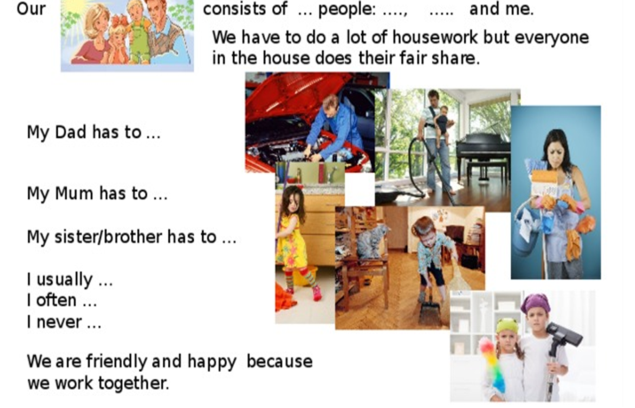
Put the phrases of the dialogue in order and dramatize it.
|
Mother: |
- I’m back home! |
|
Mary : |
- Good evening, mum. |
|
Mother: |
|
|
Mary: |
Then I have been doing some washing up and some cooking. |
|
Mother: |
- Why didn’t you ask Denis for help? |
|
Mary: |
- |
|
Mother: |
- Is he in? |
|
Mary: |
- Yes, he is. He is speaking over the telephone in his room. He has been speaking for two hours already. |
|
Mother: |
- Denis! Denis! Can you hear me? |
|
Denis: |
- Yes, mum |
|
Mother: |
- |
|
Denis: |
- I’ll do it now. |
|
Mother: |
- |
|
Denis: |
No, I haven’t. I’ll do it this week. |
|
Mother: |
- So, what have you been doing since you came home? |
|
Denis: |
- |
|
Mary: |
- Really? The washing machine stopped an hour ago. |
|
Denis: |
- Why didn’t you tell me? |
|
Mary: |
- You were the person who has been washing his pants and socks, weren’t you? Why did I have to tell you. |
-When are you going to tidy up your bedroom?
-I did. But he didn’t want to!
- Good evening, dear. Why aren’t you doing your homework?
-Well… I have been washing my pants and socks…
-Haven’t you clean your bike, yet? It’s really dirty!
Put the phrases of the dialogue in order and dramatize it.
|
Mother: |
- I’m back home! |
|
Mary : |
- Good evening, mum. |
|
Mother: |
- Good evening, dear. Why aren’t you doing your homework? |
|
Mary: |
|
|
Mother: |
- Why didn’t you ask Denis for help? |
|
Mary: |
- I did. But he didn’t want to! |
|
Mother: |
- Is he in? |
|
Mary: |
|
|
Mother: |
- Denis! Denis! Can you hear me? |
|
Denis: |
- Yes, mum |
|
Mother: |
- When are you going to tidy up your bedroom? |
|
Denis: |
|
|
Mother: |
- Haven’t you clean your bike, yet? It’s really dirty! |
|
Denis: |
-No, I haven’t. I’ll do it this week. |
|
Mother: |
- |
|
Denis: |
- Well… I have been washing my pants and socks… |
|
Mary: |
- Really? The washing machine stopped an hour ago. |
|
Denis: |
|
|
Mary: |
- You were the person who has been washing his pants and socks, weren’t you? Why did I have to tell you. |
- Why didn’t you tell me?
- I have been ironing some clothes and cleaning the carpet.
Then I have been doing some washing up and some cooking.
- I’ll do it now.
-So, what have you been doing since you came home?
- Yes, he is. He is speaking over the telephone in his room.
He has been speaking for two hours already.
Make up 6 sentences with these word-combinations and tell your classmates.
Don’t forget about PRESENT SIMPLE
I … every day.
My mother usually …..es
My father never…… es, but he often … es.
My brother sometimes … ..es.
My grandma… …es.
My grandpa… ..es.
Make up 6 sentences with these word-combinations and tell your classmates.
Don’t forget about PRESENT SIMPLE
I … every day.
My mother usually …..es
My father never…… es, but he often … es.
My brother sometimes … ..es.
My grandma… …es.
My grandpa… ..es.
Make up 6 sentences with these word-combinations and tell your classmates.
Don’t forget about PRESENT SIMPLE
I … every day.
My mother usually …..es
My father never…… es, but he often … es.
My brother sometimes … ..es.
My grandma… …es.
My grandpa… ..es.
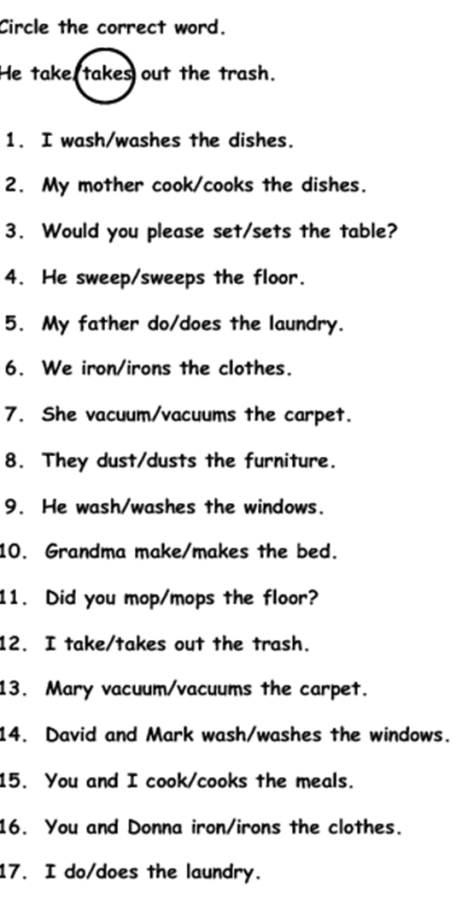
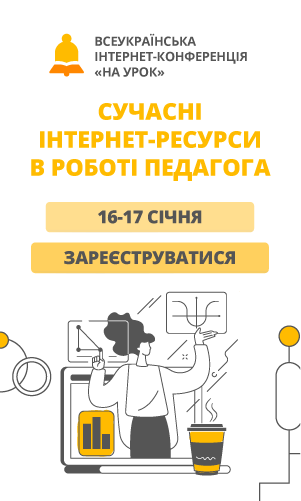

про публікацію авторської розробки
Додати розробку
